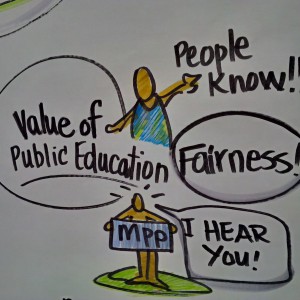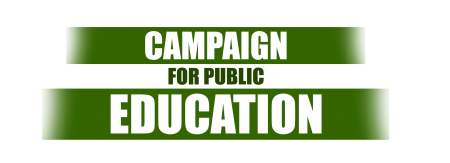public education is about empathy
 There is a basic cognitive science result I call “pre-conscious assimilation.” Within a tenth of a second, incoming information — whether in language, vision, or touch — is unconsciously changed, often radically, to information that better fits what is already in your brain. In short, what you become conscious of often depends on what you already assume, not on external facts presented.
There is a basic cognitive science result I call “pre-conscious assimilation.” Within a tenth of a second, incoming information — whether in language, vision, or touch — is unconsciously changed, often radically, to information that better fits what is already in your brain. In short, what you become conscious of often depends on what you already assume, not on external facts presented.
Those brain structures are called “frames.” If the facts don’t fit your frames, the frames stay; the facts are ignored, belittled or attacked. The facts alone won’t set you free.
All words are defined relative to largely unconscious cognitive frames. Hearing a word activates and strengthens the frame. If I say “Don’t think of an elephant!” you will think of an elephant. Arguing against, or negating, frames just helps the other side.
This is a key insight for politicians. All politics is about morality, about doing what you assume is right. Different policies follow from different notions of morality. When you speak your moral language, you strengthen your political frames. When you speak in the language of your opponents, regardless of what you say, you only strengthen theirs.
Conservatives understand this. They are trained not to use progressive language, but to use conservative language and conservative frames. Conservative training institutes have for decades been educating tens of thousands of conservatives on how to think and talk conservative.
That is how a conservative minority has come to rule Canada, overwhelming the progressive majority spread across three parties. A prerequisite for bringing the parties together is unifying progressive thought and language, and training ordinary Canadians, who are overwhelmingly progressive, to understand the values that unite them across parties and issues, and to learn to express those values no matter which party you are in.
Being a progressive is natural to Canadians. It means caring about others as well as taking care of yourself, and it means working through the government to provide public resources for all. Private business and private life depend on public resources — roads, bridges, sewers, an electric grid, satellite communication, public schools and research universities, public health and national health care, public safety, and on and on. The private depends on the public, both in business and private life.
This truth is the basis of what has traditionally been the best in Canadian life: kindness, warmth, hospitality, co-operation, community and what goes with all that, including public education, health care for all, a love of nature and care for the environment, a welcoming of immigrants, a respect for native peoples, an aversion to war. As an American, those were the values that I and other Americans associated with Canada. The centre has been empathy – caring and acting on that care.
Until Stephen Harper — and the American framing and communication industry that made him possible.
Conservatives have a different understanding of morality and with it, democracy. Conservative morality means individual responsibility, not social responsibility. Every man his own authority, not depending on or accepting any responsibility for others.
But conservatism means denying a central truth: that private life and business depend on public resources. Indeed, it means destroying public resources and maximizing private control and private gain. It means putting public health in private hands, making everyone pay through the nose for maintaining their bodies. It means destroying unions. Unions are about freedom, freedom from corporate servitude and wage slavery, freedom from unsafe working conditions, and the freedom in later life that comes from fair pensions, which are delayed payments for work done earlier in life. It means destroying nature for private gain, not public benefit.
This is what we’ll get as long as progressives focus their political efforts on fighting within conservative frames. For progressives to win, they must become aware of and state their deepest values, and they must bring back to life, through language, the values that made Canada Canada.
That starts with saying the unsaid, what progressives know but don’t utter: Working people are profit creators and as such, deserve a fair share of the profits — a living wage and safe, reasonable working conditions. It means saying that corporations control our lives in thousands of ways — for their benefit, not ours, and with no accountability to an electorate. We need to point out that ensuring our food is safe and that our cosmetics don’t cause cancer requires that we are able to constrain the power of private interests.
After all, we might point out, the private depends on public resources so it really ought to better serve the public good.
George Lakoff is Distinguished Professor of Cognitive Science and Linguistics at the University of California, Berkeley and the author of The All New Don’t Think of an Elephant. THE tORONTO STAR


